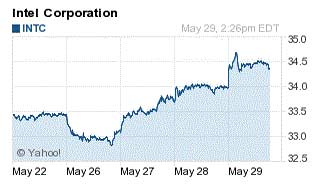Intel stock nudged up today (Friday) as yet another report hinted that the iconic chipmaker was close to an acquisition of Altera Corp. (Nasdaq: ALTR) for $15 billion.
Thursday evening the New York Post reported that the Intel-Altera deal could happen "as early as next week." It was the latest rumor of a merger between the two companies, the first coming via The Wall Street Journal March 27.
 Friday's report had Intel Corp. (Nasdaq: INTC) stock up 1.46% to $34.51 by midday.
Friday's report had Intel Corp. (Nasdaq: INTC) stock up 1.46% to $34.51 by midday.
Wall Street clearly approves of the deal. INTC stock is up more than 14% since word of a possible deal first broke. That's unusual for an acquiring company, which typically sees its stock stay flat or drop a little.
But Altera would give Intel a boost in the one area with the most potential to grow Intel's business...
These Sales Are the Key for Intel Stock
An Altera acquisition would boost Intel's data center segment. Data center revenue was up 19% in Intel's most recent quarter, while revenue from its sales of PC processors was flat.
You see, Intel is in the middle of a transition from earning most of its profits from the sales of PC chips to earning most of its profits from its data center business. Just four years ago, Intel's Data Center Group (DCG) contributed 30% of the company's profits. In Q1 of 2015, that had grown to 50%.
Intel projects DCG sales will grow 15% a year for the next four years. Profits will grow even faster, as the data center business enjoys higher profit margins than Intel's other units.
Adding Altera would help Intel stock by bringing a key technology in-house. Called field-programmable gate arrays (FPGAs), it makes processors much more customizable. FPGAs have proven especially useful in tailoring chips for the specialized tasks found in data centers. And that customization makes the chips faster and more efficient.
[epom key="ddec3ef33420ef7c9964a4695c349764" redirect="" sourceid="" imported="false"]
Intel already uses Altera's FPGA technology in its data center chips. But owning it outright would allow it to better incorporate the technology in its products.
An explosion in data center construction is expected in the years ahead, fed by such trends as cloud computing, Big Data, and the Internet of Things.
Intel already dominates the data center market, but rivals using ARM Holdings Plc. (Nasdaq ADR: ARMH) competing technology would like to eat into that dominance.
So in essence, buying Altera is a "the best defense is a good offense" strategy. Owning Altera's FPGA technology is one way Intel can keep its competitive edge in the data center space.
And that will help propel Intel stock higher for the next several years.
Intel stock is down 5% year to date but has steadily climbed since the Altera deal news broke in March. INTC's dividend yield is 2.79% and it has a price/earnings ratio of 14.64.
Follow me on Twitter @DavidGZeiler.
More Semiconductor M&A: FPGA is what makes Altera attractive to Intel, but Altera shares the FPGA market with another: Xilinx Inc. (Nasdaq: XLNX). The attention on a possible Intel-Altera deal has washed over to Xilinx, which is now a prime target for acquisition. Here are the top semiconductor companies with good reasons to buy Xilinx...
About the Author
David Zeiler, Associate Editor for Money Morning at Money Map Press, has been a journalist for more than 35 years, including 18 spent at The Baltimore Sun. He has worked as a writer, editor, and page designer at different times in his career. He's interviewed a number of well-known personalities - ranging from punk rock icon Joey Ramone to Apple Inc. co-founder Steve Wozniak.
Over the course of his journalistic career, Dave has covered many diverse subjects. Since arriving at Money Morning in 2011, he has focused primarily on technology. He's an expert on both Apple and cryptocurrencies. He started writing about Apple for The Sun in the mid-1990s, and had an Apple blog on The Sun's web site from 2007-2009. Dave's been writing about Bitcoin since 2011 - long before most people had even heard of it. He even mined it for a short time.
Dave has a BA in English and Mass Communications from Loyola University Maryland.



